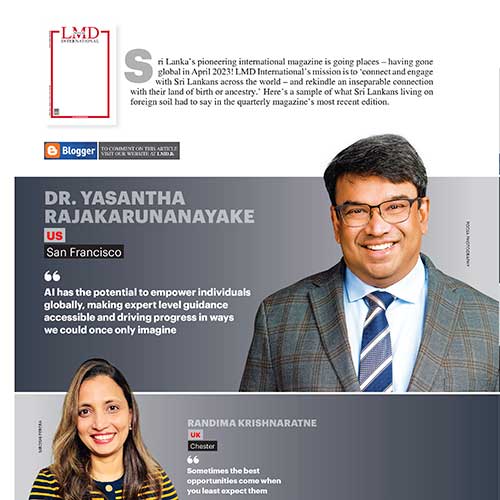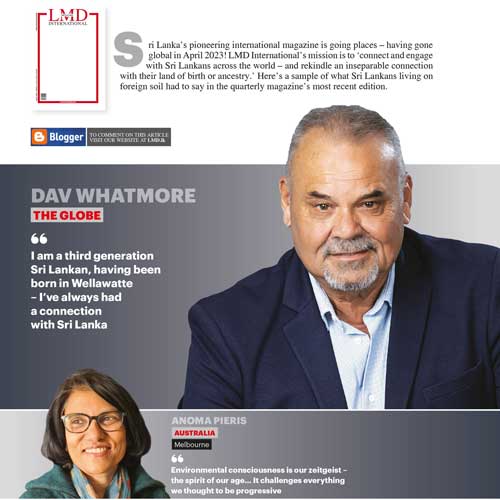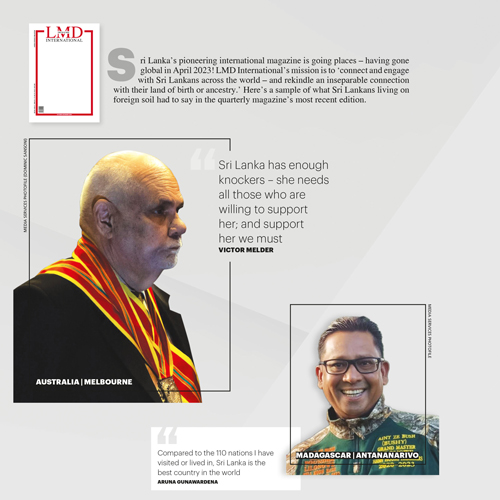
WORK IN PROGRESS
Christine Tranchell sheds light on what ails her motherland
Q:How do you perceive Sri Lanka today?
A: We have come far and achieved a lot. However, compared to what I see in Europe, we need improved social security, healthcare and a safety net for the people.
 For example, if someone loses their job in Europe due to the current crisis, the government provides them with 70-80 percent of the income they earned before the pandemic until they’re employed once more.
For example, if someone loses their job in Europe due to the current crisis, the government provides them with 70-80 percent of the income they earned before the pandemic until they’re employed once more.
Sri Lankans don’t have such a safety net and the country has a long way to go in terms of socioeconomic development.
Q: As far as perceptions go, do you think Sri Lanka is capable of regaining its composure in the aftermath of the COVID-19 pandemic?
A: Sri Lanka is capable of anything because we are a resilient people and manage to overcome whatever comes our way.
At the beginning, the nation was better able to control the spread of the disease than European countries but since of late, it seems to have regressed. But I do believe that the country can regain its composure simply because of the resilience of our people.
 Q: And how do compatriots in your country of domicile view Sri Lanka?
Q: And how do compatriots in your country of domicile view Sri Lanka?
A: Most people view Sri Lanka as a great tourist destination – some have visited the island and would love to return.
However, I feel many still think that we only have sun, sea and sand to offer, and don’t realise that there’s much more to enjoy on the island.
Q: How do other Sri Lankans living in your country of domicile view the island?
A: So far, I have only met Sri Lankans from the UK. And even they believe that although Sri Lanka has come a long way in infrastructure development, the nation has yet to uplift the standard of living of its people.
Q:What were your impressions of Sri Lanka on your last visit and how much has it changed?
A: I visited in 2018 and was surprised to see how much the traffic has improved in Colombo (although others disagree with me), and didn’t recognise some parts of the city due to the ongoing development of various businesses and hotels.
Infrastructure has improved quite a lot. However, the cost of living seems to have gone sky high and things were much more expensive than I remembered – some items were even more expensive than in Europe.
Q: From afar, how do you perceive news about Sri Lanka and what media do you rely on to stay connected especially during times of crisis?
 A: I’m in touch with my family and friends on WhatsApp, Facebook, Viber or simple messaging and calling people. I also listen to radio channels in Sri Lanka and of course, the local news here in Europe and CNN.
A: I’m in touch with my family and friends on WhatsApp, Facebook, Viber or simple messaging and calling people. I also listen to radio channels in Sri Lanka and of course, the local news here in Europe and CNN.
Q: How do you view the brain drain and why is there still no reversal of it, in your opinion?
A: Our country situation is still not politically stable; and without a strong government, you can’t expect much socioeconomic improvement.
We do not have social security or respect for each other. Those with good networks are well off while others are left behind irrespective of their skills or knowledge. The lack of economic security is also a major problem.
Q:What should Sri Lanka focus on most in the coming decade?
 A: Take Europe as an example as to how the government is protecting farmers, businesses and people. Place more emphasis on developing and protecting the rainforests, wildlife and agriculture, and provide farmers with a stable income and benefits.
A: Take Europe as an example as to how the government is protecting farmers, businesses and people. Place more emphasis on developing and protecting the rainforests, wildlife and agriculture, and provide farmers with a stable income and benefits.
Introduce a uniform set of laws and have a floor or ceiling for all income earners no matter what their job is. For instance, we pay high taxes in Europe but in return, we are provided medical benefits and pensions, and parents are paid a certain sum for each child until they turn 18 and so on.
Q: And what are your hopes for the country in the next decade or so?
A: I hope that people will learn to respect each other regardless of their status and we will have intelligent qualified leaders governing our country, and more knowledgeable people will run for political office.






